H S Vishnoi Solutions for Exercise 2: Review Questions
H S Vishnoi Biology Solutions for Exercise - H S Vishnoi Solutions for Exercise 2: Review Questions
Attempt the practice questions from Exercise 2: Review Questions with hints and solutions to strengthen your understanding. Concise Biology Part-II Class 10 solutions are prepared by Experienced Embibe Experts.
Questions from H S Vishnoi Solutions for Exercise 2: Review Questions with Hints & Solutions
Study the following diagram carefully and then answer the question that follows:

Mention two structural differences between 1 and 2.
Study the following diagram carefully and then answer the question that follows:

Name the process occurring in B and C and state the importance of this process in the human body.
Given below is a diagrammatic representation of certain types of blood vessels in human body.
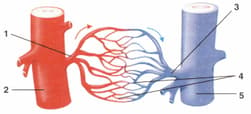
Identify the types of blood vessels numbered 1 to 5.
Given below is a diagrammatic representation of certain types of blood vessels in the human body.
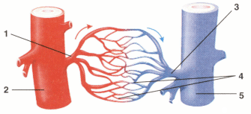
Where can such an arrangement be found as an example? [Hint: These are a pair of spongy, air-filled organs located on either side of the chest.]
The diagram below shows part of the capillary bed in an organ of the human body. Some of the blood arriving at the capillaries at points labelled A, moves out into the spaces between the tissue cells. Study the diagram and answer the question that follows:
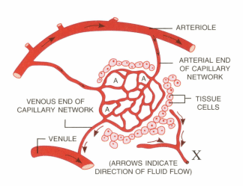
When the liquid from the blood surrounds the cells, what is it called?
The diagram below shows part of the capillary bed in an organ of the human body. Some of the blood arriving at the capillaries at points labelled A, moves out into the spaces between the tissue cells. Study the diagram and answer the question that follows:
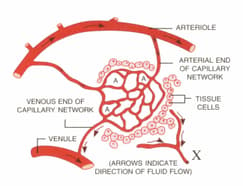
Name any one important component of the blood that remains inside the capillaries and fails to move out into the spaces.
The diagram below shows part of the capillary bed in an organ of the human body. Some of the blood arriving at the capillaries at points labelled A, moves out into the spaces between the tissue cells. Study the diagram and answer the question that follow:
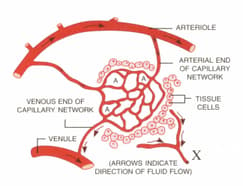
Some of the liquid surrounding the cells does not pass directly back into the blood but eventually reaches it by another route through vessel X. Name the fluid present in vessel X.
The diagram below shows part of the capillary bed in an organ of the human body. Some of the blood arriving at the capillaries at points labelled A, moves out into the spaces between the tissue cells. Study the diagram and answer the question that follows:
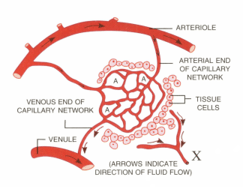
State two important functions performed in our body by the fluid present in vessel X.
